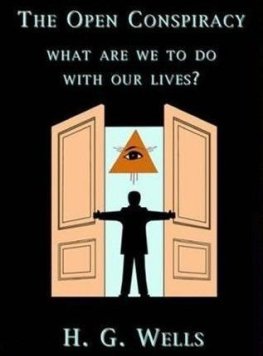Herbert Wells - Twelve Stories and a Dream
Here you can read online Herbert Wells - Twelve Stories and a Dream full text of the book (entire story) in english for free. Download pdf and epub, get meaning, cover and reviews about this ebook. genre: Science fiction. Description of the work, (preface) as well as reviews are available. Best literature library LitArk.com created for fans of good reading and offers a wide selection of genres:
Romance novel
Science fiction
Adventure
Detective
Science
History
Home and family
Prose
Art
Politics
Computer
Non-fiction
Religion
Business
Children
Humor
Choose a favorite category and find really read worthwhile books. Enjoy immersion in the world of imagination, feel the emotions of the characters or learn something new for yourself, make an fascinating discovery.

- Book:Twelve Stories and a Dream
- Author:
- Genre:
- Rating:5 / 5
- Favourites:Add to favourites
- Your mark:
- 100
- 1
- 2
- 3
- 4
- 5
Twelve Stories and a Dream: summary, description and annotation
We offer to read an annotation, description, summary or preface (depends on what the author of the book "Twelve Stories and a Dream" wrote himself). If you haven't found the necessary information about the book — write in the comments, we will try to find it.
Twelve Stories and a Dream — read online for free the complete book (whole text) full work
Below is the text of the book, divided by pages. System saving the place of the last page read, allows you to conveniently read the book "Twelve Stories and a Dream" online for free, without having to search again every time where you left off. Put a bookmark, and you can go to the page where you finished reading at any time.
Font size:
Interval:
Bookmark:
TWELVE STORIES AND A DREAM
By H. G. Wells
1. FILMER
In truth the mastery of flying was the work of thousands of menthis man a suggestion and that an experiment, until at last only one vigorous intellectual effort was needed to finish the work. But the inexorable injustice of the popular mind has decided that of all these thousands, one man, and that a man who never flew, should be chosen as the discoverer, just as it has chosen to honour Watt as the discoverer of steam and Stephenson of the steam-engine. And surely of all honoured names none is so grotesquely and tragically honoured as poor Filmer's, the timid, intellectual creature who solved the problem over which the world had hung perplexed and a little fearful for so many generations, the man who pressed the button that has changed peace and warfare and well-nigh every condition of human life and happiness. Never has that recurring wonder of the littleness of the scientific man in the face of the greatness of his science found such an amazing exemplification. Much concerning Filmer is, and must remain, profoundly obscureFilmers attract no Boswellsbut the essential facts and the concluding scene are clear enough, and there are letters, and notes, and casual allusions to piece the whole together. And this is the story one makes, putting this thing with that, of Filmer's life and death.
The first authentic trace of Filmer on the page of history is a document in which he applies for admission as a paid student in physics to the Government laboratories at South Kensington, and therein he describes himself as the son of a "military bootmaker" ("cobbler" in the vulgar tongue) of Dover, and lists his various examination proofs of a high proficiency in chemistry and mathematics. With a certain want of dignity he seeks to enhance these attainments by a profession of poverty and disadvantages, and he writes of the laboratory as the "gaol" of his ambitions, a slip which reinforces his claim to have devoted himself exclusively to the exact sciences. The document is endorsed in a manner that shows Filmer was admitted to this coveted opportunity; but until quite recently no traces of his success in the Government institution could be found.
It has now, however, been shown that in spite of his professed zeal for research, Filmer, before he had held this scholarship a year, was tempted, by the possibility of a small increase in his immediate income, to abandon it in order to become one of the nine-pence-an-hour computers employed by a well-known Professor in his vicarious conduct of those extensive researches of his in solar physicsresearches which are still a matter of perplexity to astronomers. Afterwards, for the space of seven years, save for the pass lists of the London University, in which he is seen to climb slowly to a double first class B.Sc., in mathematics and chemistry, there is no evidence of how Filmer passed his life. No one knows how or where he lived, though it seems highly probable that he continued to support himself by teaching while he prosecuted the studies necessary for this distinction. And then, oddly enough, one finds him mentioned in the correspondence of Arthur Hicks, the poet.
"You remember Filmer," Hicks writes to his friend Vance; "well, HE hasn't altered a bit, the same hostile mumble and the nasty chinhow CAN a man contrive to be always three days from shaving?and a sort of furtive air of being engaged in sneaking in front of one; even his coat and that frayed collar of his show no further signs of the passing years. He was writing in the library and I sat down beside him in the name of God's charity, whereupon he deliberately insulted me by covering up his memoranda. It seems he has some brilliant research on hand that he suspects me of all peoplewith a Bodley Booklet a-printing!of stealing. He has taken remarkable honours at the Universityhe went through them with a sort of hasty slobber, as though he feared I might interrupt him before he had told me alland he spoke of taking his D.Sc. as one might speak of taking a cab. And he asked what I was doingwith a sort of comparative accent, and his arm was spread nervously, positively a protecting arm, over the paper that hid the precious ideahis one hopeful idea.
"'Poetry,' he said, 'Poetry. And what do you profess to teach in it, Hicks?'
"The thing's a Provincial professorling in the very act of budding, and I thank the Lord devoutly that but for the precious gift of indolence I also might have gone this way to D.Sc. and destruction..."
A curious little vignette that I am inclined to think caught Filmer in or near the very birth of his discovery. Hicks was wrong in anticipating a provincial professorship for Filmer. Our next glimpse of him is lecturing on "rubber and rubber substitutes," to the Society of Artshe had become manager to a great plastic-substance manufactoryand at that time, it is now known, he was a member of the Aeronautical Society, albeit he contributed nothing to the discussions of that body, preferring no doubt to mature his great conception without external assistance. And within two years of that paper before the Society of Arts he was hastily taking out a number of patents and proclaiming in various undignified ways the completion of the divergent inquiries which made his flying machine possible. The first definite statement to that effect appeared in a halfpenny evening paper through the agency of a man who lodged in the same house with Filmer. His final haste after his long laborious secret patience seems to have been due to a needless panic, Bootle, the notorious American scientific quack, having made an announcement that Filmer interpreted wrongly as an anticipation of his idea.
Now what precisely was Filmer's idea? Really a very simple one. Before his time the pursuit of aeronautics had taken two divergent lines, and had developed on the one hand balloonslarge apparatus lighter than air, easy in ascent, and comparatively safe in descent, but floating helplessly before any breeze that took them; and on the other, flying machines that flew only in theoryvast flat structures heavier than air, propelled and kept up by heavy engines and for the most part smashing at the first descent. But, neglecting the fact that the inevitable final collapse rendered them impossible, the weight of the flying machines gave them this theoretical advantage, that they could go through the air against a wind, a necessary condition if aerial navigation was to have any practical value. It is Filmer's particular merit that he perceived the way in which the contrasted and hitherto incompatible merits of balloon and heavy flying machine might be combined in one apparatus, which should be at choice either heavier or lighter than air. He took hints from the contractile bladders of fish and the pneumatic cavities of birds. He devised an arrangement of contractile and absolutely closed balloons which when expanded could lift the actual flying apparatus with ease, and when retracted by the complicated "musculature" he wove about them, were withdrawn almost completely into the frame; and he built the large framework which these balloons sustained, of hollow, rigid tubes, the air in which, by an ingenious contrivance, was automatically pumped out as the apparatus fell, and which then remained exhausted so long as the aeronaut desired. There were no wings or propellers to his machine, such as there had been to all previous aeroplanes, and the only engine required was the compact and powerful little appliance needed to contract the balloons. He perceived that such an apparatus as he had devised might rise with frame exhausted and balloons expanded to a considerable height, might then contract its balloons and let the air into its frame, and by an adjustment of its weights slide down the air in any desired direction. As it fell it would accumulate velocity and at the same time lose weight, and the momentum accumulated by its down-rush could be utilised by means of a shifting of its weights to drive it up in the air again as the balloons expanded. This conception, which is still the structural conception of all successful flying machines, needed, however, a vast amount of toil upon its details before it could actually be realised, and such toil Filmeras he was accustomed to tell the numerous interviewers who crowded upon him in the heyday of his fame"ungrudgingly and unsparingly gave." His particular difficulty was the elastic lining of the contractile balloon. He found he needed a new substance, and in the discovery and manufacture of that new substance he had, as he never failed to impress upon the interviewers, "performed a far more arduous work than even in the actual achievement of my seemingly greater discovery."
Font size:
Interval:
Bookmark:
Similar books «Twelve Stories and a Dream»
Look at similar books to Twelve Stories and a Dream. We have selected literature similar in name and meaning in the hope of providing readers with more options to find new, interesting, not yet read works.
Discussion, reviews of the book Twelve Stories and a Dream and just readers' own opinions. Leave your comments, write what you think about the work, its meaning or the main characters. Specify what exactly you liked and what you didn't like, and why you think so.


